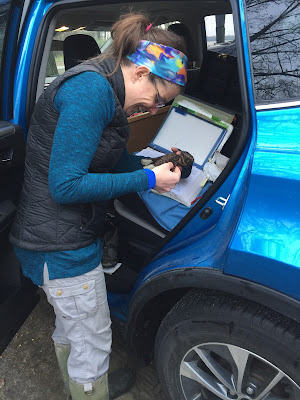Whip-poor-will, I? Oh yes, I will!
As mentioned in the previous post, there are researchers here from Texas Tech that are placing nanotags on migratory bats. As bats are nocturnal, the researchers must trap at night and sometimes, in doing so, they happen to inadvertently catch a nocturnal bird in their nets. And this past week, they did just that: they caught an Eastern Whip-poor-Will whilst they were trapping for bats and because they're such awesome guys and we've all taken a blood oath when we joined the Motus project, they brought me this amazing bird to band.
Okay, so I'm joking about the blood oath thing but definitely not about how amazing these birds are! Perhaps you've heard their namesake call which they do continuously on spring and summer nights:
Whip-poor-wills are awesome birds for so many reasons but did you know that they've experienced a 75% cumulative decline between 1966 and 2015 and are on the 2016 State of North America's Birds' Watch List because of this decline? One of the main causes of this decline is thought to be the loss of open-understory forests. They are also a US-Canada Stewardship species and we're very thrilled to have them breeding here in the park.





